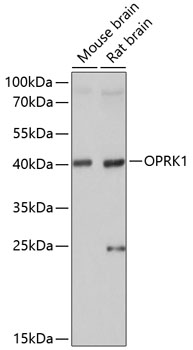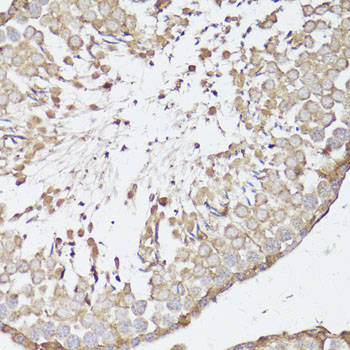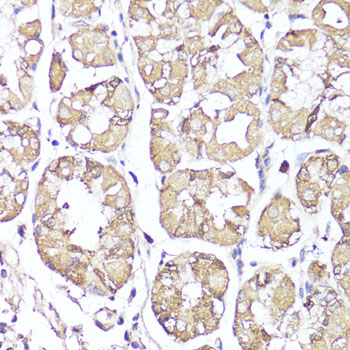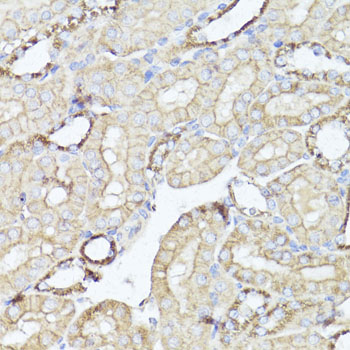-
Product Name
OPRK1 Polyclonal Antibody
- Documents
-
Description
Polyclonal antibody to OPRK1
-
Tested applications
WB, IHC, IF
-
Species reactivity
Human, Mouse, Rat
-
Alternative names
OPRK1 antibody; K-OR-1 antibody; KOR antibody; KOR-1 antibody; OPRK antibody; opioid receptor kappa 1 antibody
-
Isotype
Rabbit IgG
-
Preparation
Antigen: A synthetic peptide corresponding to a sequence within amino acids 300 to the C-terminus of human OPRK1 (NP_000903.2).
-
Clonality
Polyclonal
-
Formulation
PBS with 0.02% sodium azide, 50% glycerol, pH7.3.
-
Storage instructions
Store at -20℃. Avoid freeze / thaw cycles.
-
Applications
WB 1:500 - 1:2000
IHC 1:50 - 1:200
IF 1:50 - 1:200 -
Validations

Western blot - OPRK1 Polyclonal Antibody
Western blot analysis of extracts of various cell lines, using OPRK1 antibody at 1:1000 dilution.Secondary antibody: HRP Goat Anti-Rabbit IgG (H+L) at 1:10000 dilution.Lysates/proteins: 25ug per lane.Blocking buffer: 3% nonfat dry milk in TBST.Detection: ECL Basic Kit .Exposure time: 5s.

Immunohistochemistry - OPRK1 Polyclonal Antibody
Immunohistochemistry of paraffin-embedded rat testis using OPRK1 antibody at dilution of 1:100 (40x lens).

Immunohistochemistry - OPRK1 Polyclonal Antibody
Immunohistochemistry of paraffin-embedded human stomach using OPRK1 antibody at dilution of 1:100 (40x lens).

Immunohistochemistry - OPRK1 Polyclonal Antibody
Immunohistochemistry of paraffin-embedded mouse kidney using OPRK1 antibody at dilution of 1:100 (40x lens).
-
Background
G-protein coupled opioid receptor that functions as receptor for endogenous alpha-neoendorphins and dynorphins, but has low affinity for beta-endorphins. Also functions as receptor for various synthetic opioids and for the psychoactive diterpene salvinorin A. Ligand binding causes a conformation change that triggers signaling via guanine nucleotide-binding proteins (G proteins) and modulates the activity of down-stream effectors, such as adenylate cyclase. Signaling leads to the inhibition of adenylate cyclase activity. Inhibits neurotransmitter release by reducing calcium ion currents and increasing potassium ion conductance. Plays a role in the perception of pain. Plays a role in mediating reduced physical activity upon treatment with synthetic opioids. Plays a role in the regulation of salivation in response to synthetic opioids. May play a role in arousal and regulation of autonomic and neuroendocrine functions.
Related Products / Services
Please note: All products are "FOR RESEARCH USE ONLY AND ARE NOT INTENDED FOR DIAGNOSTIC OR THERAPEUTIC USE"
